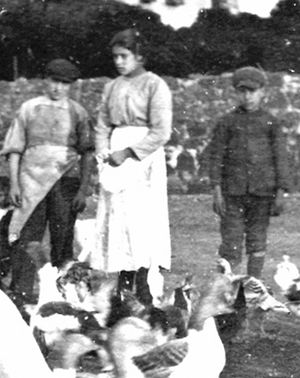The story of Maria Teresa Goretti, the saint whose feast we celebrate each July 6th, has been made known to many since her untimely death on that date in 1902. The 11-year old peasant girl died as a result of injuries inflicted by Alessandro Serenelli, a young man determined to force her to submit to his inappropriate advances. When she resisted, crying, “No! No! It is a sin!” he stabbed her repeatedly, a total of fourteen times. Maria underwent unsuccessful surgery without benefit of anesthesia and died the following day, after receiving her greatly-desired First Communion.
These are the basic facts of Maria Goretti’s final hours on earth. At the time of her canonization in 1950, she was the youngest person ever raised to sainthood in the Catholic Church. She has been hailed as virgin, martyr, and patroness of youth. Countless miracles have been attributed to her intercession.
What perhaps is not so well-known is the role played by forgiveness in the story of the young girl whose brief life of extreme poverty, little education, and unending hard work came to such a violent end.
Maria was no stranger to Alessandro’s advances, having warded them off successfully on numerous previous occasions. What became clear as events played themselves out is that her refusals, while prompted by her staunch faith and unwavering moral sense, also evidenced her concern for Alessandro’s immortal soul.
Even in the midst of his horrific attack on her person, her cries that his actions were sinful were meant to convince him of their grave threat to his soul. Later, despite the intensity of her suffering on her deathbed, Maria voiced forgiveness for her attacker and her desire to have him with her in heaven one day.
For Alessandro’s part, his early years spent in prison found him steadfastly unrepentant. Over time, he began to decline physically and emotionally. It was during this period that he experienced a vision of Maria in a vivid dream. She smiled at him and handed him fourteen lilies, warm to his touch as each was placed in his hand.
This evidence of Maria’s forgiveness brought about a miraculous change in Alessandro’s life. It was a totally different Alessandro, repentant and contrite, who served the remainder of his sentence. After his release from prison, Alessandro approached Maria’s mother to beg her forgiveness, but she already had forgiven him.
In a message released in 2002, the centenary of Saint Maria Goretti’s death, Saint Pope John Paul II commented on the aspect of forgiveness as demonstrated in our young martyr’s story:
“ … Her [Maria Goretti’s] forgiveness of the man who killed her and her desire to be able to meet him one day in heaven deserve special attention. This spiritual and social message is of extraordinary relevance in our time.
“The saint's mother, for her part, pardoned [Serenelli] on behalf of the family in the hall of the tribunal where his trial was taking place. We do not know whether it was the mother who taught her daughter to forgive or the martyr's forgiveness on her death-bed that determined her mother's conduct. Yet it is certain that the spirit of forgiveness motivated relations within the whole Goretti family, and for this reason could be so naturally expressed by both the martyr and her mother.”
Alessandro Serenelli spent the remainder of his long life as a Franciscan Tertiary, working as a gardener at a Capuchin monastery. In 1961, as age 80 approached, he composed a written testament preparatory to his death there nine years later. In part, it read: “Maria Goretti, now a Saint, was my good Angel, sent to me through Providence to guide and save me. I still have impressed upon my heart her words of rebuke and of pardon. She prayed for me, she interceded for her murderer.”
Saint Maria Goretti’s forgiveness worked a miracle in the life of the very person who had caused her premature death. The 2002 message of Saint Pope John Paul II continues: “Maria Goretti's murderer recognized the sin he had committed. He asked forgiveness of God and of the martyr's family, conscientiously expiated his crime and lived the rest of his life in this spiritual frame of mind.”
So we see that there is much more to the story of Saint Maria Goretti than the terrible crime against her and the agonizing death she suffered. In the end, hers is a story of the power of forgiveness – from her tortured cry of sin during the attack; to her deathbed desire to have her attacker with her in heaven; to her mother’s words of forgiveness; to the vision of the lilies, symbols of purity warmed by her holy hands.
In her childhood, Maria Goretti, unschooled and practically illiterate, struggled to learn her catechism. However, surely she had memorized the prayer taught to us by Jesus Himself (Mt 6:9-13). The story of her life – and of her death – proves that she took to heart the words of the Lord’s Prayer that we often find so difficult to embrace: “forgive us our trespasses as we forgive those who trespass against us.” It is in these words that we discover, as she did, the power of forgiveness.
Saint Maria Goretti, Virgin and Martyr, teach us the power of forgiveness!
© All Rights Reserved, Living His Life Abundantly®/Women of Grace® http://www.womenofgrace.com

